Reviews: Read What Others Are Saying: page 18
216 ★★★★★ reviews
148 ★★★★★ reviews
92 ★★★★★ reviews
137 ★★★★★ reviews
Novel Card Effects with a Gumball Machine
Overall customer rating: ★★★★★reviewed by Joe Libby (confirmed purchase)
Rating: ★★★★★ (Date Added: Tuesday 13 February, 2024)
 If you've been hesitant to buy one of those gimmicked gumball machines because they cost $500 or more, this ebook may be of great use to you. Just follow Devin's instructions (which are not difficult), and in short order you'll have your own magic gumball machine for about $35 to $40.
If you've been hesitant to buy one of those gimmicked gumball machines because they cost $500 or more, this ebook may be of great use to you. Just follow Devin's instructions (which are not difficult), and in short order you'll have your own magic gumball machine for about $35 to $40.
The ebook includes instructions for several strong routines, at least one of which would be suitable for kid shows. I'm looking forward to adding this to my shows. Recommended.
Anatomy of Gaming
Overall customer rating: ★★★★★reviewed by Gregg Webb (confirmed purchase)
Rating: ★★★★★ (Date Added: Monday 12 February, 2024)
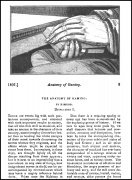 I am interested in Erdnase and hoped to find some words or passages in this book which would indicate that Erdnase also read it, and I did in a few places. But, all in all Anatomy of Gambling by Nimrod is not an interesting book. Probably written for a magazine at the time, in installments, it is very old British and includes very verbose wordage. While I like Erdnase's use of interesting words, here Nimrod goes overboard. He is basically explaining how bad gambling is for society, what with the loss of wealthy people's entire fortunes and estates, and suicides and duels fought because of losses from it, but he uses every word he can think of rather than get to the point. If one is looking for many many words to construct a simple thought, then this is the book for you.
I am interested in Erdnase and hoped to find some words or passages in this book which would indicate that Erdnase also read it, and I did in a few places. But, all in all Anatomy of Gambling by Nimrod is not an interesting book. Probably written for a magazine at the time, in installments, it is very old British and includes very verbose wordage. While I like Erdnase's use of interesting words, here Nimrod goes overboard. He is basically explaining how bad gambling is for society, what with the loss of wealthy people's entire fortunes and estates, and suicides and duels fought because of losses from it, but he uses every word he can think of rather than get to the point. If one is looking for many many words to construct a simple thought, then this is the book for you.
While Erdnase, and under another pseudonym for himself, Eugene Edwards in the newspaper stories and book Jack Pots, as well as Maskelyne's and Houdin's books on gambling, show how words can be used in an interesting way, I found Nimrod to be overly loquacious and I found myself wondering if he was a lawyer expecting to be paid by the word.
While I'll probably finish it, I wanted to report how tedious a read it is.
ESP Cards with Bicycle Back Marked
Overall customer rating: ★★★★★reviewed by Curtis Foster (confirmed purchase)
Rating: ★★★★★ (Date Added: Monday 12 February, 2024)
 These cards are so good. The marks are very easy to read. The quality of the cards is superb. I’m very happy with my purchase.
These cards are so good. The marks are very easy to read. The quality of the cards is superb. I’m very happy with my purchase.
The Frog Prince
Overall customer rating: ★★★★★reviewed by James Donaldson (confirmed purchase)
Rating: ★★★★★ (Date Added: Monday 05 February, 2024)
 This trick is Awesome!!! It is great for adults and children both. Michael does a great job in providing a step-by-step guide in how to perform this trick. This trick will become a staple to my repertoire. I am truly surprised I have never seen this trick before. It is well worth its price. Thank you for making it available.
This trick is Awesome!!! It is great for adults and children both. Michael does a great job in providing a step-by-step guide in how to perform this trick. This trick will become a staple to my repertoire. I am truly surprised I have never seen this trick before. It is well worth its price. Thank you for making it available.
Cold Reading Lecture 2012
Overall customer rating: ★★★★★reviewed by Gregg Webb (confirmed purchase)
Rating: ★★★★★ (Date Added: Sunday 04 February, 2024)
 I was actually looking for Herb Dewey books but I found this instead and am very glad I did. It is a wonderful lecture and I learned what I was looking for in my hunt for real info on this subject. If you are interested in readings or mentalism or psychology, I would highly recommend this download.
I was actually looking for Herb Dewey books but I found this instead and am very glad I did. It is a wonderful lecture and I learned what I was looking for in my hunt for real info on this subject. If you are interested in readings or mentalism or psychology, I would highly recommend this download.
Flip-M-Out
Overall customer rating: ★★★★★reviewed by Patrick Warsalla (confirmed purchase)
Rating: ★★★★★ (Date Added: Friday 02 February, 2024)
 This is a great piece of close-up magic. It is not difficult even for a card guy like me! (I have a few coin tricks but definitely still a "beginner" in the move department. I have known Ron for about 4 yrs now, both thru a Zoom magic room and from Abbott's Magic Get Together in Colon, Michigan. Still in touch with him and luckily if need any help with a move or don't understand something, he is always willing to help. He also is a master of invisible thread and all around nice guy.
This is a great piece of close-up magic. It is not difficult even for a card guy like me! (I have a few coin tricks but definitely still a "beginner" in the move department. I have known Ron for about 4 yrs now, both thru a Zoom magic room and from Abbott's Magic Get Together in Colon, Michigan. Still in touch with him and luckily if need any help with a move or don't understand something, he is always willing to help. He also is a master of invisible thread and all around nice guy.
Calendario Cartomagico
Overall customer rating: ★★★★★reviewed by Salvatore Lazzaro (confirmed purchase)
Rating: ★★★★★ (Date Added: Friday 02 February, 2024)
The Calostro Mind Reading Act
Overall customer rating: ★★★★★reviewed by Joel Alexandre (confirmed purchase)
Rating: ★★★★★ (Date Added: Thursday 01 February, 2024)
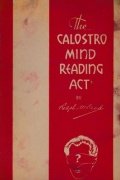 I have received the e-book.
I understand the mnemonic system used.
I know the Major System and the Dominic O'Brian system and the Andi Bell system.
I had a field day.
Loved the Book. I give it a 5-star.
I have received the e-book.
I understand the mnemonic system used.
I know the Major System and the Dominic O'Brian system and the Andi Bell system.
I had a field day.
Loved the Book. I give it a 5-star.
Cut The Cards
Overall customer rating: ★★★★★reviewed by Piero Giani (confirmed purchase)
Rating: ★★★★★ (Date Added: Thursday 01 February, 2024)
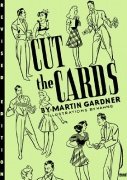 Absolutely a great book that made me find exactly what I was looking for, thank you!
Absolutely a great book that made me find exactly what I was looking for, thank you!
The Royal Road to Card Magic
Overall customer rating: ★★★★★reviewed by Alexander Shulyatsky (confirmed purchase)
Rating: ★★★★★ (Date Added: Tuesday 30 January, 2024)
 It's brilliant! The highest recommendation!
It's brilliant! The highest recommendation!
Psycho-Mentisis
Overall customer rating: ★★★★★reviewed by Gregg Webb (confirmed purchase)
Rating: ★★★★★ (Date Added: Monday 29 January, 2024)
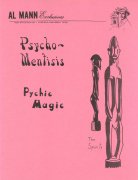 Slightly bizarre. Be aware that Al Mann's manuscripts have a very low production value, and the ideas may seem to not be practical at first read, you may find some things of interest after all. There are some items that need to be made and then worked with to get the knack, such as a switching device made of a wallet with a magnet. Paper clips seem to link, and end up really linked, due to a magnetized chain of paper clips switched for paper clips that really are linked. A similar thing with safety pins. He mixes in Jerry Andrus's idea also. A similar thing with nails that bend and some that just seem to bend but are really switched with sleight-of-hand. Then there are some really odd things with bringing bugs back to life. Finally, a dancing doll that is probably workable if you get the required strange magnets...possibly at a hobby store. The real bonus is that Bob McAllister's wonderful levitation Walking On Air, which Bob used to perform everywhere and anywhere, is explained here, except for a few technical improvements and the ability to get all the parts on Canal Street which is where Bob got all his from. All the tricks read as terrible ideas, but if you can figure out what he's actually talking about...you could revive Metal Bending and Bob McAllister's Walking On Air if you study this and read the Ads for Bob's version. Some may dislike the book and a few and far between readers may like it, or parts of it.
Slightly bizarre. Be aware that Al Mann's manuscripts have a very low production value, and the ideas may seem to not be practical at first read, you may find some things of interest after all. There are some items that need to be made and then worked with to get the knack, such as a switching device made of a wallet with a magnet. Paper clips seem to link, and end up really linked, due to a magnetized chain of paper clips switched for paper clips that really are linked. A similar thing with safety pins. He mixes in Jerry Andrus's idea also. A similar thing with nails that bend and some that just seem to bend but are really switched with sleight-of-hand. Then there are some really odd things with bringing bugs back to life. Finally, a dancing doll that is probably workable if you get the required strange magnets...possibly at a hobby store. The real bonus is that Bob McAllister's wonderful levitation Walking On Air, which Bob used to perform everywhere and anywhere, is explained here, except for a few technical improvements and the ability to get all the parts on Canal Street which is where Bob got all his from. All the tricks read as terrible ideas, but if you can figure out what he's actually talking about...you could revive Metal Bending and Bob McAllister's Walking On Air if you study this and read the Ads for Bob's version. Some may dislike the book and a few and far between readers may like it, or parts of it.
Stanley Collins Force
Overall customer rating: ★★★★★reviewed by Jon Bowne (confirmed purchase)
Rating: ★★★★★ (Date Added: Friday 26 January, 2024)
 Clear, succinct demonstration and teaching of the move. You don't have to be a move monkey to do this force. Recommended.
Clear, succinct demonstration and teaching of the move. You don't have to be a move monkey to do this force. Recommended.
Annemann's Mental Bargain Effects
Overall customer rating: ★★★★★reviewed by Thomas Jones (confirmed purchase)
Rating: ★★★★★ (Date Added: Thursday 25 January, 2024)
 If you’re a Mentalist (or magician) you want this in your collection. There are a number of great routines in here.
If you’re a Mentalist (or magician) you want this in your collection. There are a number of great routines in here.
202 Methods of Forcing
Overall customer rating: ★★★★★reviewed by Thomas Jones (confirmed purchase)
Rating: ★★★★★ (Date Added: Thursday 25 January, 2024)
 This is a classic. Many good number forces in here. Some are outdated but can be tweaked for a modern audience.
This is a classic. Many good number forces in here. Some are outdated but can be tweaked for a modern audience.
China's Song
Overall customer rating: ★★★★★reviewed by Daniel Terelmes (confirmed purchase)
Rating: ★★★★★ (Date Added: Wednesday 24 January, 2024)
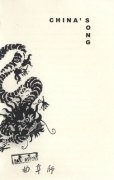 It's a quick hustle. Something that you can win a bet with. I think with some work you can craft a nice routine with this. The instructions describe two ways to work the con. Is it worth $10? For me, yes. I haven't seen this before and will use it. For the merely curious, probably not. Which makes it even more worth the $10.
It's a quick hustle. Something that you can win a bet with. I think with some work you can craft a nice routine with this. The instructions describe two ways to work the con. Is it worth $10? For me, yes. I haven't seen this before and will use it. For the merely curious, probably not. Which makes it even more worth the $10.
Calendario Cartomagico
Overall customer rating: ★★★★★reviewed by Alessandro Marino
Rating: ★★★★★ (Date Added: Wednesday 24 January, 2024)
 Al mio avviso il calendario è stato fatto con i piedi ci sono errori gravissimi che saltano nell'occhio, ci sono alcune carte in tutti i mesi che nello stesso mese si ripetono, sono carte che non fanno parte della routine e si ripetono più volte, faccio alcuni esempi nel mese di gennaio giorno 2e13 gennaio si ripete la carta 3 di picche, un altro esempio nel mese di dicembre abbiamo nei giorni 1,12 e 28 si ripete la carta il 3 di cuori. questi sono alcuni esempi ma in tutti i mesi ci sono questi errori gravissimi, va bene che le carte sono 52 ed i giorni sono 365, 366, quindi per logica nei vari mesi si ripetono ma avere la stessa carta che si ripete nello stesso mese come negli esempi che ho citato fa capire che non è stato costruito con precisione, c'è stata troppa leggerezza. Con un calendario così dopo che uno spettatore nota questa cosa,(perchè salta parecchio nel occhio) come dovrei giustificare una cosa del genere? Quindi non solo che ho pagato soldi per l'acquisto, ma con fatica ho dovuto sistemarlo. Poi per quanto riguarda le routine conoscendo la grandezza di Aldo Colombini sinceramente mi aspettavo meglio su 8 routine quelle che sono state diciamo di mio gradimento sono solo 3, fortunatamente con la scusante che ho risistemato il calendario ho aggiunto 2 routine che sono state considerate migliori...
Al mio avviso il calendario è stato fatto con i piedi ci sono errori gravissimi che saltano nell'occhio, ci sono alcune carte in tutti i mesi che nello stesso mese si ripetono, sono carte che non fanno parte della routine e si ripetono più volte, faccio alcuni esempi nel mese di gennaio giorno 2e13 gennaio si ripete la carta 3 di picche, un altro esempio nel mese di dicembre abbiamo nei giorni 1,12 e 28 si ripete la carta il 3 di cuori. questi sono alcuni esempi ma in tutti i mesi ci sono questi errori gravissimi, va bene che le carte sono 52 ed i giorni sono 365, 366, quindi per logica nei vari mesi si ripetono ma avere la stessa carta che si ripete nello stesso mese come negli esempi che ho citato fa capire che non è stato costruito con precisione, c'è stata troppa leggerezza. Con un calendario così dopo che uno spettatore nota questa cosa,(perchè salta parecchio nel occhio) come dovrei giustificare una cosa del genere? Quindi non solo che ho pagato soldi per l'acquisto, ma con fatica ho dovuto sistemarlo. Poi per quanto riguarda le routine conoscendo la grandezza di Aldo Colombini sinceramente mi aspettavo meglio su 8 routine quelle che sono state diciamo di mio gradimento sono solo 3, fortunatamente con la scusante che ho risistemato il calendario ho aggiunto 2 routine che sono state considerate migliori...
The Gig Avalanche
Overall customer rating: ★★★★★reviewed by Cristian Vidrascu (confirmed purchase)
Rating: ★★★★★ (Date Added: Monday 22 January, 2024)
 I like many of Devin Knight's ideas. This idea for increasing gigs may not be the most stellar, but it is something I had not thought about and should definitely work, in the short run. It is easy to do even for introverted people, and doesn't involve creepy sales pitches. As we become more and more virtual, and move away from life as we knew it, it may not work as well in the future as it did in the past. I have not tried it but may do so. In any case, I doubt many people have thought of this marketing approach, and recommend the ebook at this price point. It may not work in every jurisdiction, however. In most locations, it should work, though.
I like many of Devin Knight's ideas. This idea for increasing gigs may not be the most stellar, but it is something I had not thought about and should definitely work, in the short run. It is easy to do even for introverted people, and doesn't involve creepy sales pitches. As we become more and more virtual, and move away from life as we knew it, it may not work as well in the future as it did in the past. I have not tried it but may do so. In any case, I doubt many people have thought of this marketing approach, and recommend the ebook at this price point. It may not work in every jurisdiction, however. In most locations, it should work, though.
My Favorite Easy Mental Card Magic
Overall customer rating: ★★★★★reviewed by Christopher M. Reynolds (confirmed purchase)
Rating: ★★★★★ (Date Added: Monday 22 January, 2024)
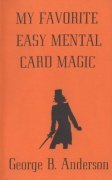 I need another book on card tricks like JFK needs another hole in his head. They're my wife, my lover, my lady, my obsession, especially the mentalism variety.
I need another book on card tricks like JFK needs another hole in his head. They're my wife, my lover, my lady, my obsession, especially the mentalism variety.
With ten dollars burning a hole in my pocket, MY FAVORITE EASY MENTAL CARD MAGIC by George G. Anderson satisfied my craving for all things pasteboard.
While not a household name, George G. Anderson worked as a mentalist after a long career in newspaper and radio. He earned the trust of famous performers, including Howard Thurston and Blackstone Sr., and published several books on magic.
Clocking in at a hair over twenty-one pages, Anderson walks the reader (in detail) through eleven of his favorite mind-reading effects, using straightforward techniques like the Si Stebbins set-up or sneaky gimmicks like Wite-Out or paraffin wax.
Simple while not simplistic, the tricks included in MY FAVORITE EASY MENTAL CARD MAGIC are a refreshing change of pace from practicing technically complicated sleight-of-hand (and failing miserably).
Will you learn anything new or revelatory? Probably not. Although this is not a MUST-HAVE ebook, it gave me hours of pleasure while sitting at home on a rainy afternoon playing around with my cards.
This pamphlet is for you if that's your idea of a good time (like I do).
Subliminal Influence
Overall customer rating: ★★★★★reviewed by Jesse Hittle (confirmed purchase)
Rating: ★★★★★ (Date Added: Monday 22 January, 2024)
 If you’re a fan of ACAAN you will really enjoy this! There are also other effects that all work very well into a routine.
If you’re a fan of ACAAN you will really enjoy this! There are also other effects that all work very well into a routine.
Card Sharping Exposed
Overall customer rating: ★★★★★reviewed by Gregg Webb (confirmed purchase)
Rating: ★★★★★ (Date Added: Sunday 21 January, 2024)
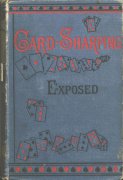 Because of my interest in Erdnase, I read the earlier books on card sharping that I could find. I found one in German, Mysterien des Kartenspiel, and feel it is a blueprint for other works, but then I read Maskelyne's book Sharps and Flats, which I felt was very well written. Next, I read this one, by Houdin and translated by Prof. Hoffman, which I now feel came before the Maskelyne book, and which is even more well written. It starts with some storytelling about the world of the crooked gamblers and swindlers, and then tells some info I never read before about details on thimble rigging.
Because of my interest in Erdnase, I read the earlier books on card sharping that I could find. I found one in German, Mysterien des Kartenspiel, and feel it is a blueprint for other works, but then I read Maskelyne's book Sharps and Flats, which I felt was very well written. Next, I read this one, by Houdin and translated by Prof. Hoffman, which I now feel came before the Maskelyne book, and which is even more well written. It starts with some storytelling about the world of the crooked gamblers and swindlers, and then tells some info I never read before about details on thimble rigging.
But then, it segues into the telling of the life story of the man who served as Houdin's source of information about cheating at cards. The entire subculture of the gangs of crooked gamblers is explored in great detail. A whole event is set up with crooks acting out the roles of other players, police, foreign dignitaries, ladies who watch and kibitz on the games and people who mingle and give signals, all to wipe out one sitting duck by what would be seen as a play put on in real life. This is very interestingly written about. Many examples of variations on the theme of setting up a patsy are described. This could be considered what is probably the best explanation of what happens long before the actual game begins that I have read. Again, a whole crew with costumes and roles to play are involved.
Then, the second main part of the book goes into technical details of cheating techniques and "moves" as well as marked cards, and crimps and trimmed cards such as strippers are described. Various shuffles and palming methods and passes are described.
A comparison could be made that Erdnase is better technically at describing cheating methods. Houdin's is better at the storytelling nature of the cheater subculture of that time in France. If you believe that Erdnase also wrote Jack Pots under a different pseudonym, that book could be compared to the first part of the Houdin book and is made up of stories about and the life of traveling gamblers in America.
It should be pointed out that poker was not played in France at the time of Houdin.
All in all this book goes deeper into how all the people at a gambling venue may be involved in the scam, and how they coordinate. Remember the line, "If you don't know who is the patsy in a poker game, YOU are the patsy" but applied to whist, piquet, Baccarat, etc. I enjoyed the read.
Artifact
Overall customer rating: ★★★★★reviewed by Abhinav Bothra (confirmed purchase)
Rating: ★★★★★ (Date Added: Sunday 21 January, 2024)
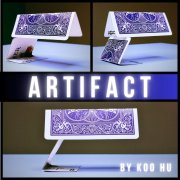 I kind of knew what I was getting into. Not disappointed!! The method here is simpler than the one in my head. Took me just 5 minutes to build. For best visuals use borderless cards like the BEE cards. If you can install it on some kind of rotating base (I've a battery-operated base from a broken showpiece). It'll be incredible. Most suspensions are non-inspectable, the same in this case. Since this is small and meant to be kept on a table or cupboard, people will come closer, touch it, and inspect it. They will appreciate the procedure employed but the wonder part will be gone.
I kind of knew what I was getting into. Not disappointed!! The method here is simpler than the one in my head. Took me just 5 minutes to build. For best visuals use borderless cards like the BEE cards. If you can install it on some kind of rotating base (I've a battery-operated base from a broken showpiece). It'll be incredible. Most suspensions are non-inspectable, the same in this case. Since this is small and meant to be kept on a table or cupboard, people will come closer, touch it, and inspect it. They will appreciate the procedure employed but the wonder part will be gone.
Suit Order Systems 1
Overall customer rating: ★★★★★reviewed by David Burmeister (confirmed purchase)
Rating: ★★★★★ (Date Added: Saturday 20 January, 2024)
 Buy all the Suit Order Systems along with the Unknown Mentalist's stacked decks. They serve me well. I give them a five-star rating.
Buy all the Suit Order Systems along with the Unknown Mentalist's stacked decks. They serve me well. I give them a five-star rating.
Stunners! Plus! Two Decades of Mental Magic
Overall customer rating: ★★★★★reviewed by David Burmeister (confirmed purchase)
Rating: ★★★★★ (Date Added: Saturday 20 January, 2024)
 What can I say? Larry Becker's material speaks for itself. I bought most of his books during the 80's and a LOT of material from Larry and Lee Earle not to mention SYZYGY Manuscript which I still have copies of the original manuscripts. All I can say is anything from them is easy to do and well worth the money. I even bought all of Larry Becker's ebooks. I give ALL their material a FIVE STAR rating.
What can I say? Larry Becker's material speaks for itself. I bought most of his books during the 80's and a LOT of material from Larry and Lee Earle not to mention SYZYGY Manuscript which I still have copies of the original manuscripts. All I can say is anything from them is easy to do and well worth the money. I even bought all of Larry Becker's ebooks. I give ALL their material a FIVE STAR rating.
Magic with an ESP Deck
Overall customer rating: ★★★★★reviewed by David Burmeister (confirmed purchase)
Rating: ★★★★★ (Date Added: Saturday 20 January, 2024)
 I have this from the 80's. It is well worth your money. Some of the effects in it like ONE in 14,400 will make a spectator appear extremely psychic. It has my highest rating.
I have this from the 80's. It is well worth your money. Some of the effects in it like ONE in 14,400 will make a spectator appear extremely psychic. It has my highest rating.
David's ESP Routine
Overall customer rating: ★★★★★reviewed by David Burmeister (confirmed purchase)
Rating: ★★★★★ (Date Added: Saturday 20 January, 2024)
 I have used this effect quite a few times close-up. It shocks lay people to death. You can use this effect as it says in the ebook but I prefer using regular ESP cards in a Himber Wallet so nothing appears gimmicked with the ESP cards. This has my highest rating.
I have used this effect quite a few times close-up. It shocks lay people to death. You can use this effect as it says in the ebook but I prefer using regular ESP cards in a Himber Wallet so nothing appears gimmicked with the ESP cards. This has my highest rating.